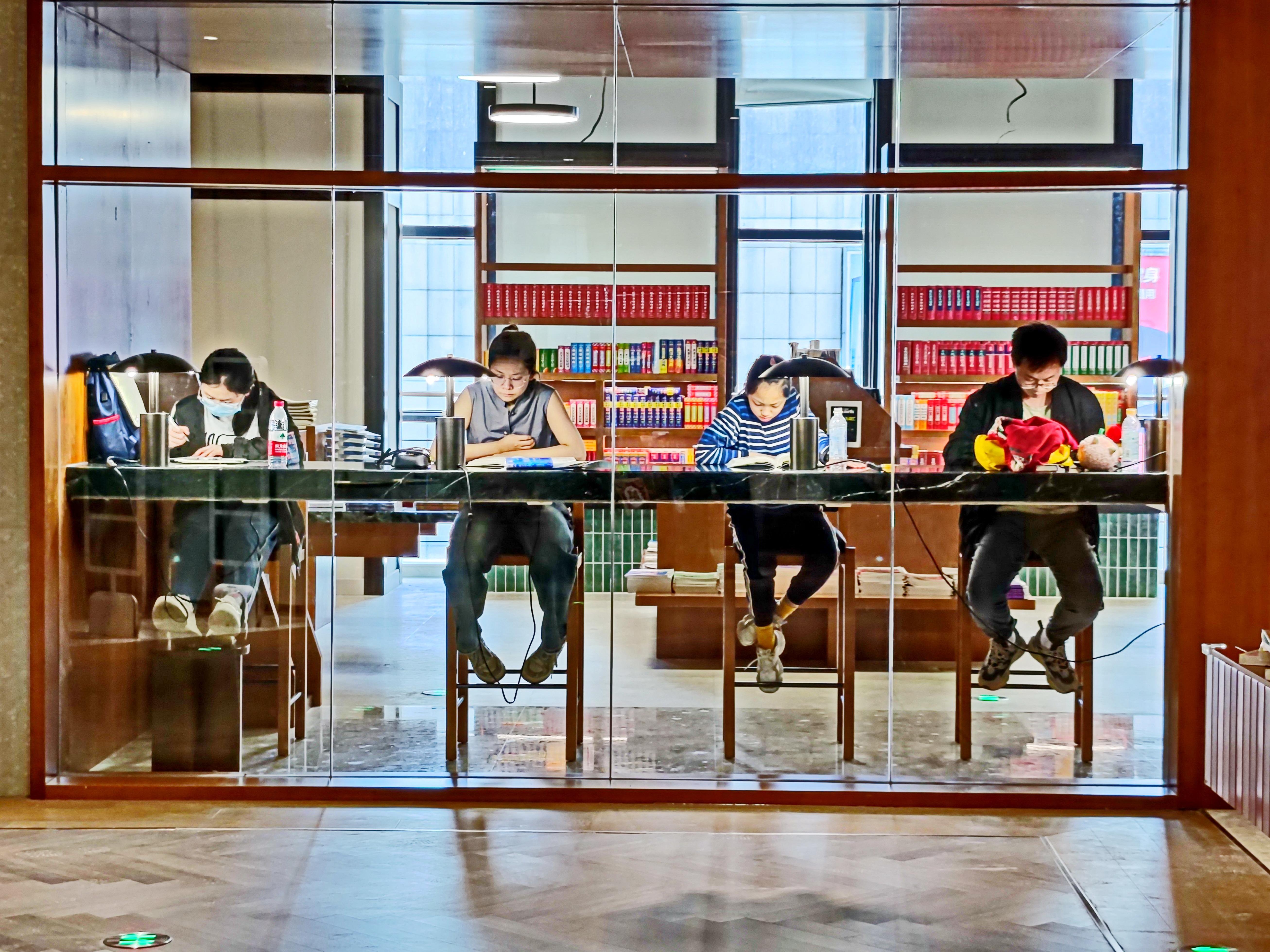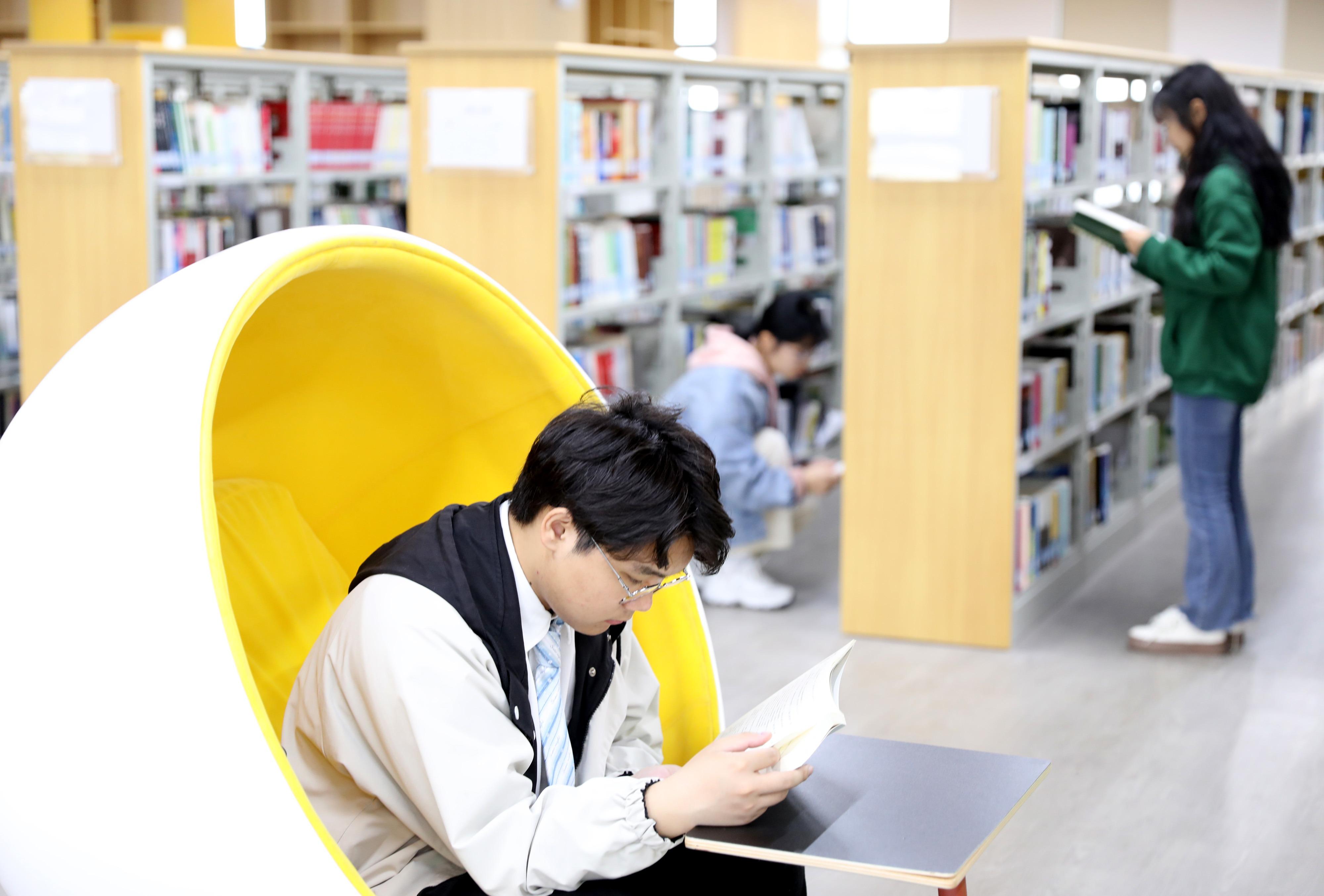Range of improvements prove beneficial for studies
 An aerial view of the main reading room at the National Library in Beijing. (ZHU XINGXIN / CHINA DAILY)
An aerial view of the main reading room at the National Library in Beijing. (ZHU XINGXIN / CHINA DAILY)
Libraries in China have transitioned from their traditional role of book repositories to offer users — especially young people — space for quiet introspection and self-improvement.
In recent years, numerous refinements have been made to libraries nationwide, and they now boast well-equipped facilities and rich collections of books.
The library, a sanctuary of knowledge, welcomes all visitors without prejudice. It is a haven where people, irrespective of their social standing, are free to seek respite from busy city life.
Shi Yunxuan, a 33-year-old who has worked at Longgang District Library in Shenzhen, Guangdong province, for two years
A study of 2,100 young respondents conducted last year by China Youth Daily's Social Survey Center in partnership with the survey platform Wenjuan.com found that 92.5 percent of participants expressed a strong desire for learning. Nearly 63 percent of the respondents said they favor doing their studies in a library.
At the start of this year, the Guangdong University of Finance and Economics' library in Guangzhou became a popular choice due to its "daydreaming zones".
These six zones, which are next to the study and reading areas, boast outdoor leisure tables and chairs, as well as numerous plants.
The zones are chosen by many students for studying, preparations for exams, and relaxation. Their main purpose is to provide students with a place to relax and to stimulate inspiration after they finish studying for the day.
Shi Yunxuan, 33, who has worked at Longgang District Library in Shenzhen, Guangdong province, for two years, said: "Libraries are now more comfortable and the new reading areas offer more seats. Due to this conducive learning atmosphere, users believe that studying in the library is a more efficient way to learn."
In addition, library users are now better motivated to pursue their study or career plans, Shi said.
"The library, a sanctuary of knowledge, welcomes all visitors without prejudice. It is a haven where people, irrespective of their social standing, are free to seek respite from busy city life. In a bustling city, the library emerges as a transformative space, offering a platform for personal growth and the pursuit of higher aspirations," she added.
Shi noticed during her daily work that the library now attracts a diverse range of young people seeking a beneficial study environment.
It accommodates adults preparing for certification exams, government job examinations, and postgraduate entrance tests, as well as students who visit to complete assignments and revise.
The former group typically spends an entire day at the library, breaking only for lunch in the dining area, before resuming studies. The latter group usually stays for one to two hours after school to complete homework, browse the shelves to select books, before returning home in time for dinner.
 A reader visits a library in Fushan district, Yantai, Shandong province. (SUN WENTAN / FOR CHINA DAILY)
A reader visits a library in Fushan district, Yantai, Shandong province. (SUN WENTAN / FOR CHINA DAILY)
Demanding jobs
Liu Gege, a third-year student studying pharmaceutical analysis at Guangdong Medical University, has been a regular visitor to the institution's library since her first year. She studies amid the peaceful atmosphere and has read a large number of books.
"I don't know why, but sometimes I feel restless and lost at home, just wanting to lie in bed and browse my phone. Time passes quickly, making me more anxious, but when I go to the library, I know I'm there to study," Liu said. "I want a quiet environment for my studies, and the library allows me to better immerse myself in my work."
She usually visits the library three to four times a week for three to five hours.
Liu studies, improves her vocabulary, reviews recent work and study progress, and plans her short-term and long-term goals. A lifestyle blogger, she sometimes takes photos of herself studying there, sharing them on the Xiaohongshu lifestyle platform and encouraging her followers to work hard together.
"I believe that regardless of development in society, the most important thing is to have a clear sense of direction. No matter what we do, books are essentials that offer guidance, provide emotional value, and offer learning techniques," Liu said.
A report in March released by the Mashang Consumer Research Institute on young people's consumption intentions this year found that housing comprises the biggest proportion of their spending, accounting for 23.21 percent, followed closely by work and study expenses, at nearly 17 percent.
The institute, which is based in Chongqing, said the statistics show that young people are more willing than others to invest in self-improvement.
Liu said: "Many job positions and educational requirements are becoming increasingly demanding, and it's clear that having professional knowledge alone is not sufficient. Other aspects, such as social skills, emotional control and personal cognition, are not covered in the classroom, so going to the library to read books is an important way to acquire such knowledge,"
She said she will continue visiting libraries for self-improvement, achieving goals and broadening her perspective by conscientiously organizing her work and studies, as she doesn't want to lose her passion for life while she is still young.
The main reason people visit libraries is changing with the times.
 Students study at night at a library in Wuhan, Hubei province. (PHOTO PROVIDED TO CHINA DAILY)
Students study at night at a library in Wuhan, Hubei province. (PHOTO PROVIDED TO CHINA DAILY)
Shi, the library worker in Shenzhen, said: "In the past, people went to a library primarily to borrow books and access information. Now, libraries have gained popularity among a growing number of young people who want to improve themselves. The peaceful environment allows them to concentrate on their studies, and those studying alongside them provide a sense of companionship and motivation."
By the end of 2021, China had 3,215 public libraries, which recorded 103 million readers.
Tang Zixuan, 20, a sophomore student at a Beijing university, said the library is the only place where she can immerse herself fully in her studies.
"At home, I feel relaxed, but only in the library can I find the perfect environment for work and study, which helps me maintain self-discipline. Being in such a setting motivates me," said Tang, who has been a regular library visitor for the past two to three years.
Since high school, she has visited a library during the winter and summer vacations for homework and studying. In her first year at university, she even stayed in the library for an entire day reading books, taking a nap at noon, and studying for a time in the afternoon.
Tang recently started to prepare for job applications after she graduates, and has taken part in various competitions to gain experience of domestic and international graduate programs. As a result, she devotes most of her time in the library to studying.
"People who go to the library, specifically to the study rooms, have a strong sense of purpose. They are preparing for exams, postgraduate entrance tests, or completing assignments," Tang said.
"I feel a little guilty if I slack off in the library. If I have an extended period of free time, I might do nothing for an entire afternoon, which only increases my anxiety. I rely on external pressure for self-discipline."
Last year, the China Youth Internet Users' Social Mentality Survey Report showed that 77 percent of a sample group reported experiencing study or work-related anxiety.
It also found that among a sample group on Sina Weibo, over 56 percent of young internet users strongly opposed the concept of "lying flat", a metaphor for disengaging from work and ambition.
The report was jointly released by Fudan University's Development Research Institute, the Center for Communication and State Governance Research, Fudan University's Global Media and Communication Studies Institute, the Bilibili Public Policy Research Institute, and Shanghai Information Security and Social Management Innovation Laboratory.
Tang said: "I feel as though I am facing overwhelming pressure, which is too demanding. I cannot truly enjoy my leisure time because I constantly feel the need to be doing things. I'm afraid of falling behind due to the increased external competition, peer pressure and a fast-paced lifestyle. Everything is so intense, so how can I find time to relax?"
She believes that the library is the only place where she can find peace while advancing her studies.
 Residents of Haikou, Hainan province, crowd the provincial library. (SU BIKUN / FOR CHINA DAILY)
Residents of Haikou, Hainan province, crowd the provincial library. (SU BIKUN / FOR CHINA DAILY)
Time of confusion
Libraries are also being visited by young people who are temporarily unemployed, but have not told their families they are out of work.
Most of their parents are from the post-'50s and post-'60s generation, who have been employed and also laid off during their youth, leading to a lack of security. For them, stability is the most important factor, and unemployment resulted in a significant change to their lives.
Gu Jun, a sociology professor at Shanghai University, said: "This generation views the age of 30 as a time for working hard and pursuing goals. However, many young people nowadays reach 30 without having found the right direction for their personal growth and aspirations. For them, turning 30 can be a time of confusion and uncertainty."
However, these young people have some time to do the things they want to do and to step back from a busy high-pressure life, before settling down, Gu added.
Zhong Fei, a 32-year-old from Shanghai who graduated from a leading university in the United States after studying computer science, has visited a library on her own every day since the department at the financial company where she used to work was disbanded last year.
"My family doesn't know that I'm unemployed, so visiting the library is a way to hide this from them. I decided not to tell them I am out of work, because I don't want them to worry about me, as this would only add to my stress," Zhong said.
She visits Pudong Library every weekday and plans to continue doing so until she finds a job.
Zhong typically arrives at the library at about 9 am and leaves between 6 pm and 7 pm. During her visits, she submits job applications, updates her resume, reads a range of books, and prepares for interviews. She is also preparing to pursue a certificate in psychological counseling.
"The library provides a quiet environment that helps me avoid distractions. It means I can focus on my tasks, and it also helps me maintain a sense of routine," she said.
 Students study at a teaching college library in Hengyang, Hunan province. (PHOTO PROVIDED TO CHINA DAILY)
Students study at a teaching college library in Hengyang, Hunan province. (PHOTO PROVIDED TO CHINA DAILY)
She has met many other young people at the library who are also searching for jobs or redefining their life plans. They all appear to be a little confused as they strive to find their self-worth. They also tell others they are at work, rather than admit they are unemployed.
Zhong said: "I believe this situation is likely to continue, because work itself has now become increasingly diverse. Once individuals are freed from the constraints of basic subsistence, many want the freedom to choose their own career paths. Rapid changes in the economic environment further exacerbate their instability, and I think this is an inevitable outcome of social development."
She visits Pudong Library and the Shanghai Library's Pudong branch, which are both usually crowded on weekdays.
The study by China Youth Daily's Social Survey Center also found that nearly 95 percent of the young respondents believe that establishing more public study spaces will enrich their cultural lives.
Just over 70 percent suggested a reasonable allocation of public study space to cater to diverse needs, while nearly 42 percent said they found it hard to locate such spaces.
Zhong said: "Nowadays, these spaces are in high demand, but there is a low supply. I believe the government should increase its support in this area to promote greater social diversity and effectively alleviate anxiety and tension in society.
"For me, the library is a place to pause, reflect on life and work, and better plan and develop my career. Learning is an important way of keeping abreast of social advances, so even if things become busier in the future, I will try to visit the library regularly to organize, recharge and learn."


